-
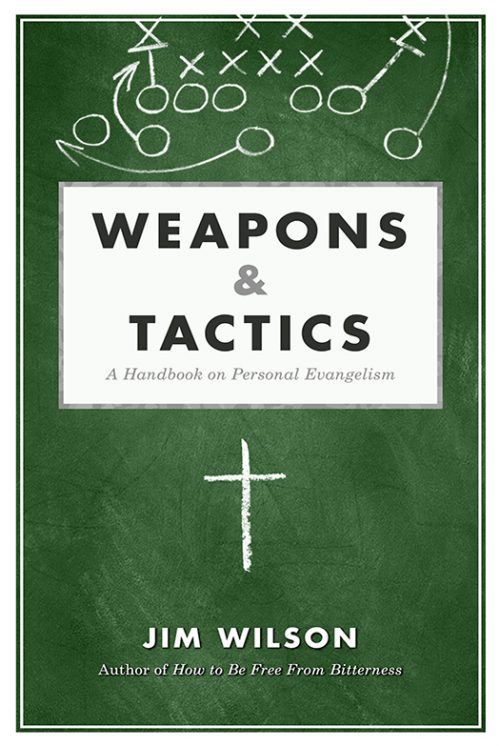 A Handbook on Personal Evangelism Even if communities understand how to follow the principles of spiritual warfare, the actually winning of souls usually occurs on the personal level. Big-picture evangelistic strategy must be complemented by an understanding of personal evangelism. Weapons & Tactics teaches individual Christians how to apply the evangelistic principles described in Principles of War. Using thorough analysis of Scripture and real-life examples, Jim Wilson provides insight on spiritual weapons (what God has given us to fight with) and tactics (the effective use of those weapons) with simple, powerful language. Weapons & Tactics calls us to personal, life-changing obedience as we follow our captain in the fight.
A Handbook on Personal Evangelism Even if communities understand how to follow the principles of spiritual warfare, the actually winning of souls usually occurs on the personal level. Big-picture evangelistic strategy must be complemented by an understanding of personal evangelism. Weapons & Tactics teaches individual Christians how to apply the evangelistic principles described in Principles of War. Using thorough analysis of Scripture and real-life examples, Jim Wilson provides insight on spiritual weapons (what God has given us to fight with) and tactics (the effective use of those weapons) with simple, powerful language. Weapons & Tactics calls us to personal, life-changing obedience as we follow our captain in the fight. -
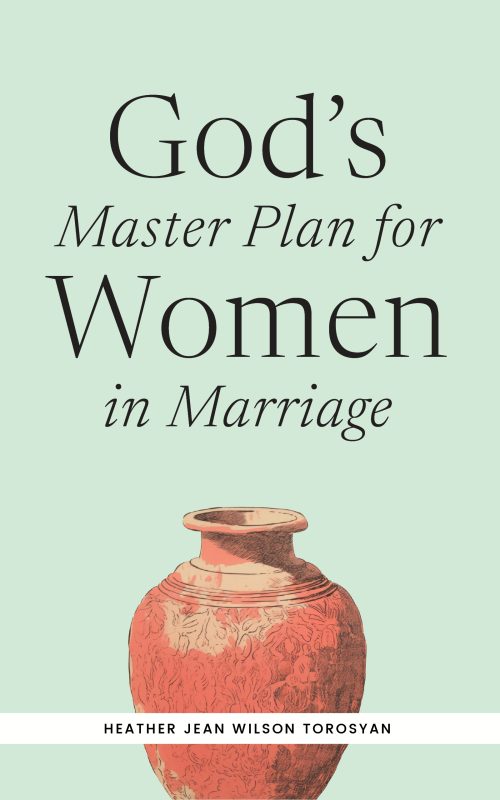 What does it mean to be a woman? Who am I? Why am I here? And how does being a Christian change that? Much of how we think about ourselves as women is determined by our culture, which today is not only not Christian, but actively anti-Christian. As Christians, we must focus on the questions above in light of our faith and think biblically about who we are, how we should behave, and what we are here for. Our Creator made us with a purpose. He has a plan, and He has the answers we need. To define ourselves as women, and as Christian women, we need to ignore the teaching of our culture and look to the Scriptures for God’s answers.
What does it mean to be a woman? Who am I? Why am I here? And how does being a Christian change that? Much of how we think about ourselves as women is determined by our culture, which today is not only not Christian, but actively anti-Christian. As Christians, we must focus on the questions above in light of our faith and think biblically about who we are, how we should behave, and what we are here for. Our Creator made us with a purpose. He has a plan, and He has the answers we need. To define ourselves as women, and as Christian women, we need to ignore the teaching of our culture and look to the Scriptures for God’s answers. -
 The Holy Spirit is in business these days. Christ is healing wounds that no one else can heal. People all over the world are experiencing the love of God in a new way. The Spirit is blowing our fences down, reconciling us to God and each other. Sin remains just talk about ethics, until the Holy Spirit comes, and we find ourselves caught red-handed in His revealing light. But the blessed Holy Spirit is not a policeman. He is the Friend of the guilty. He convicts in order to liberate. See what happens when a person comes afresh to Him.
The Holy Spirit is in business these days. Christ is healing wounds that no one else can heal. People all over the world are experiencing the love of God in a new way. The Spirit is blowing our fences down, reconciling us to God and each other. Sin remains just talk about ethics, until the Holy Spirit comes, and we find ourselves caught red-handed in His revealing light. But the blessed Holy Spirit is not a policeman. He is the Friend of the guilty. He convicts in order to liberate. See what happens when a person comes afresh to Him. -
 Africa was their home. Could they ever go back? Physical weakness coupled with civil unrest in the Ivory Coast had extended a six-month furlough to several years and threatened to derail the Leidenfrosts’ plans to return to their beloved Africa and continue mission work with the Bakwé people. But now they were finally going home to their village…or so they thought. “On top of all this, a subtle grief over the loss of Africa continued to grip my heart. In my dismal state, I felt the clouds part and God’s presence come down to touch His child. God saw the pain, the loneliness, the need, and was telling me that I was not forgotten. It was too easy to focus on my troubles. I needed to remember that His love is stronger, more real, than the pain I was suffering at that moment. Was I going to focus on His love, or on the pain?” Join Lisa Leidenfrost as she walks through trial after trial and learns to keep her eyes on God, whom she finds by her side through it all. This book is especially recommended for anyone experiencing a long-term health challenge or other hardship with an uncertain outcome.
Africa was their home. Could they ever go back? Physical weakness coupled with civil unrest in the Ivory Coast had extended a six-month furlough to several years and threatened to derail the Leidenfrosts’ plans to return to their beloved Africa and continue mission work with the Bakwé people. But now they were finally going home to their village…or so they thought. “On top of all this, a subtle grief over the loss of Africa continued to grip my heart. In my dismal state, I felt the clouds part and God’s presence come down to touch His child. God saw the pain, the loneliness, the need, and was telling me that I was not forgotten. It was too easy to focus on my troubles. I needed to remember that His love is stronger, more real, than the pain I was suffering at that moment. Was I going to focus on His love, or on the pain?” Join Lisa Leidenfrost as she walks through trial after trial and learns to keep her eyes on God, whom she finds by her side through it all. This book is especially recommended for anyone experiencing a long-term health challenge or other hardship with an uncertain outcome. -
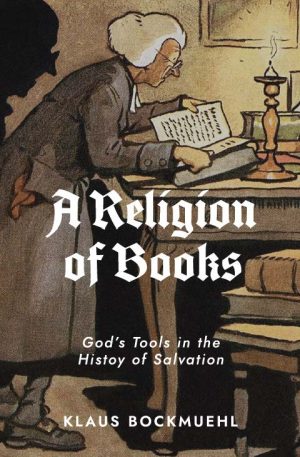 The Christian faith has repeatedly been called a “religion of the book.” Along with the incarnate Word and the oral word of preaching, God has chosen the medium of books to proclaim His goodness to us. The Bible is the book per se, and it sets the standard for the Christian faith. The Protestant Reformation of the sixteenth century saw the dramatic power of the printed word to bring light out of darkness as literature changed the thought and life of nations. The Reformers used pamphlets and tracts extensively to bring about spiritual revolution—the printing press turned out to be the lever with which the enemy was lifted from his saddle. In A Religion of Books, Bockmuehl traces the role books played in the Reformation and through various movements of the Spirit in the following centuries. He also addresses how the written word shapes political movements and how Christians can continue to use literature to point people to Christ.
The Christian faith has repeatedly been called a “religion of the book.” Along with the incarnate Word and the oral word of preaching, God has chosen the medium of books to proclaim His goodness to us. The Bible is the book per se, and it sets the standard for the Christian faith. The Protestant Reformation of the sixteenth century saw the dramatic power of the printed word to bring light out of darkness as literature changed the thought and life of nations. The Reformers used pamphlets and tracts extensively to bring about spiritual revolution—the printing press turned out to be the lever with which the enemy was lifted from his saddle. In A Religion of Books, Bockmuehl traces the role books played in the Reformation and through various movements of the Spirit in the following centuries. He also addresses how the written word shapes political movements and how Christians can continue to use literature to point people to Christ. -
 “Revolutionary love” sounds like an oxymoron. Revolution is usually a negative, violent, and destructive change, while love is positive, peaceful, and contented. But true love always changes people. And Christ’s love brings the most revolutionary change of all. Festo Kivengere (1919–88) experienced both kinds of revolution. He escaped Uganda when the brutal regime of Idi Amin seized power. But he could not escape the pursuit of Jesus, who came into his life with radically transformative grace. In Revolutionary Love, Kivengere tells his story of learning to freely receive Christ’s love and freely share it with others. Have an Audible subscription? You can also get this title on Audible here.
“Revolutionary love” sounds like an oxymoron. Revolution is usually a negative, violent, and destructive change, while love is positive, peaceful, and contented. But true love always changes people. And Christ’s love brings the most revolutionary change of all. Festo Kivengere (1919–88) experienced both kinds of revolution. He escaped Uganda when the brutal regime of Idi Amin seized power. But he could not escape the pursuit of Jesus, who came into his life with radically transformative grace. In Revolutionary Love, Kivengere tells his story of learning to freely receive Christ’s love and freely share it with others. Have an Audible subscription? You can also get this title on Audible here. -

 The 1599 Geneva Bible is a remarkable Bible for many reasons: it was the first English Bible translated entirely from the Hebrew and the Greek, it was the first Bible with chapter and verse divisions, it was the first with a legible font, and the first with maps, notes, and chronologies and indices. Most importantly, it was intended not for displaying in churches, but for family reading.With this in mind, the Modernized Geneva Bible (MGB) updates archaic syntax, spelling, and vocabulary of the first iconic Geneva version, allowing you to read without distraction the most important English Bible of the Reformation: The Geneva went into battle with the Puritans in the English Civil War, the Geneva made enemies of popes and kings across Europe, and the Geneva even went to America with the Pilgrims.But the MGB New Testament is not a facsimile edition intended for scholars of the Reformation. The thirteen thin volumes of the MGB New Testament are meant for one thing only: to be pulled off the shelf and read again and again; to be dog-eared and written in; to be consumed. We Christians learn to desire the pure milk of the Word as newborn infants (1 Pet. 2:2), for without feeding our souls we cannot grow spiritually.
The 1599 Geneva Bible is a remarkable Bible for many reasons: it was the first English Bible translated entirely from the Hebrew and the Greek, it was the first Bible with chapter and verse divisions, it was the first with a legible font, and the first with maps, notes, and chronologies and indices. Most importantly, it was intended not for displaying in churches, but for family reading.With this in mind, the Modernized Geneva Bible (MGB) updates archaic syntax, spelling, and vocabulary of the first iconic Geneva version, allowing you to read without distraction the most important English Bible of the Reformation: The Geneva went into battle with the Puritans in the English Civil War, the Geneva made enemies of popes and kings across Europe, and the Geneva even went to America with the Pilgrims.But the MGB New Testament is not a facsimile edition intended for scholars of the Reformation. The thirteen thin volumes of the MGB New Testament are meant for one thing only: to be pulled off the shelf and read again and again; to be dog-eared and written in; to be consumed. We Christians learn to desire the pure milk of the Word as newborn infants (1 Pet. 2:2), for without feeding our souls we cannot grow spiritually. -
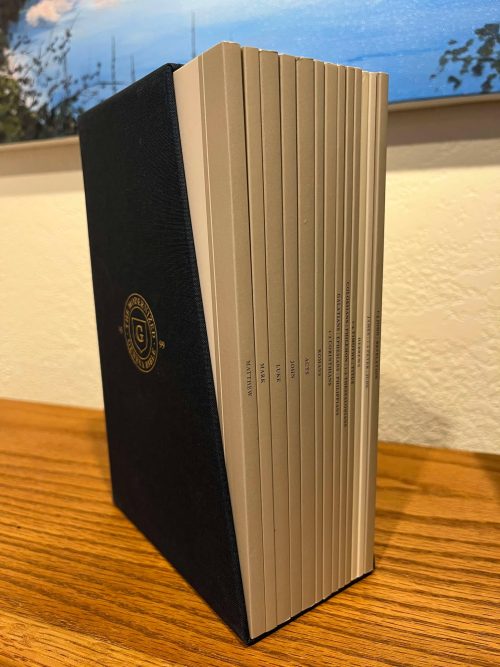
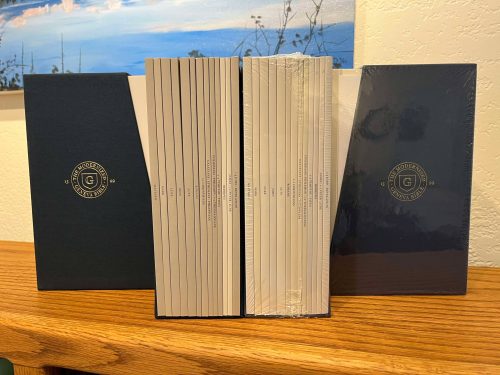 The cover colors on the individual volumes are mismatched. No other issues. The 1599 Geneva Bible is a remarkable Bible for many reasons: it was the first English Bible translated entirely from the Hebrew and the Greek, it was the first Bible with chapter and verse divisions, it was the first with a legible font, and the first with maps, notes, and chronologies and indices. Most importantly, it was intended not for displaying in churches, but for family reading.With this in mind, the Modernized Geneva Bible (MGB) updates archaic syntax, spelling, and vocabulary of the first iconic Geneva version, allowing you to read without distraction the most important English Bible of the Reformation: The Geneva went into battle with the Puritans in the English Civil War, the Geneva made enemies of popes and kings across Europe, and the Geneva even went to America with the Pilgrims.But the MGB New Testament is not a facsimile edition intended for scholars of the Reformation. The thirteen thin volumes of the MGB New Testament are meant for one thing only: to be pulled off the shelf and read again and again; to be dog-eared and written in; to be consumed. We Christians learn to desire the pure milk of the Word as newborn infants (1 Pet. 2:2), for without feeding our souls we cannot grow spiritually.
The cover colors on the individual volumes are mismatched. No other issues. The 1599 Geneva Bible is a remarkable Bible for many reasons: it was the first English Bible translated entirely from the Hebrew and the Greek, it was the first Bible with chapter and verse divisions, it was the first with a legible font, and the first with maps, notes, and chronologies and indices. Most importantly, it was intended not for displaying in churches, but for family reading.With this in mind, the Modernized Geneva Bible (MGB) updates archaic syntax, spelling, and vocabulary of the first iconic Geneva version, allowing you to read without distraction the most important English Bible of the Reformation: The Geneva went into battle with the Puritans in the English Civil War, the Geneva made enemies of popes and kings across Europe, and the Geneva even went to America with the Pilgrims.But the MGB New Testament is not a facsimile edition intended for scholars of the Reformation. The thirteen thin volumes of the MGB New Testament are meant for one thing only: to be pulled off the shelf and read again and again; to be dog-eared and written in; to be consumed. We Christians learn to desire the pure milk of the Word as newborn infants (1 Pet. 2:2), for without feeding our souls we cannot grow spiritually. -
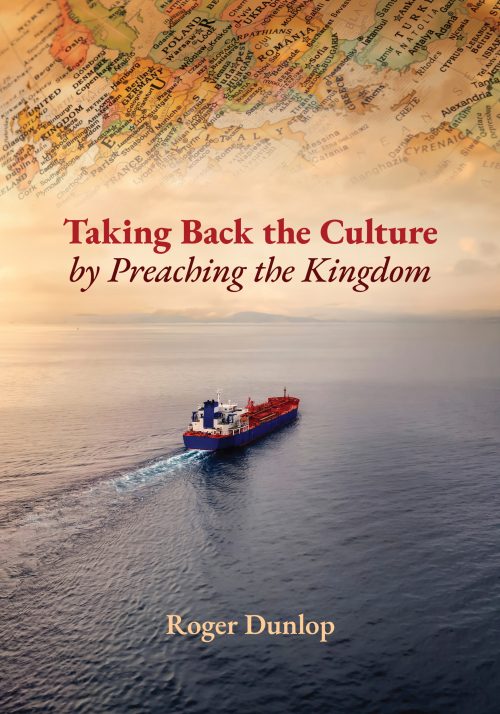 How should Christians react when the culture around them is disintegrating and drifting towards chaos? Should we hunker down, praying and waiting for relief - consoled by God's ultimate control and authority? Or is our calling and commission to respond instead with hopeful vigour and positivity to these unfamiliar testing times? This book calls us to the latter option. There is hope; this is Christ's world; all authority has been given to Him. He is King of kinds and He is bringing all things under His control. And we are His instruments, His hands and feet - so there is work for us to do. This books sets out the grounds for this hope, explains our role in bringing it about, and, above all, tells us how we must begin - by preaching the kingdom.
How should Christians react when the culture around them is disintegrating and drifting towards chaos? Should we hunker down, praying and waiting for relief - consoled by God's ultimate control and authority? Or is our calling and commission to respond instead with hopeful vigour and positivity to these unfamiliar testing times? This book calls us to the latter option. There is hope; this is Christ's world; all authority has been given to Him. He is King of kinds and He is bringing all things under His control. And we are His instruments, His hands and feet - so there is work for us to do. This books sets out the grounds for this hope, explains our role in bringing it about, and, above all, tells us how we must begin - by preaching the kingdom. -
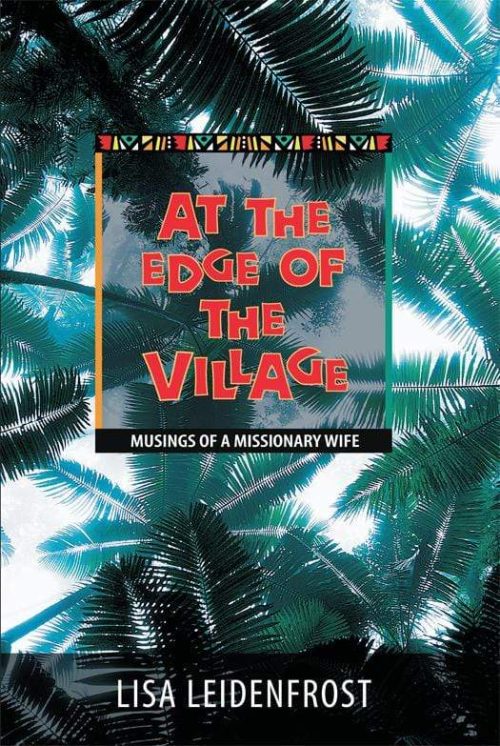
What is it like being a missionary in Africa? Danger, joy, love, and lots of laughter.
A missionary's life is not just danger, hard work, and culture shock, interspersed with moments of high joys and deep sorrows. In this book consisting of both narrative and letters to her church, Lisa Leidenfrost shows that it also consists of the small, daily things, the quotidian experience which makes life at the edge of a village as familiar as life in America. This book features the ordinary and extraordinary, the solemn and playful, the mundane and exotic—all coming together to create a down-to-earth portrait of the Gospel at work in a family and a society .From the Book:
"Step into our world, a place of laughter and tears, trials and hopes, events captured and stories told. They are stories of life, lived out on the mission field in Africa where the hand of God is ever present in every situation. They are stories of daily events, of cultural experiences recounted, of friends loved and lost, and of trials surmounted. They are stories of bothersome situations turned to laughter as God gives us the ability to find humor in various hardships—a humor that has kept us sane over all these years. They are mostly stories of the familiar things in life, the little things that lend spice to our daily experience. Not all of missionary life is extraordinary or bizarre. Most of it is just normal, common events that unfold one day into another. And because God is good, there is a beauty in living, a purpose beyond our own mere existence that can make even the smallest things we do burst with life and meaning, laughter and delight. Too often these small, commonplace things go unnoticed unless they are caught and brought to life in words, words which become a lens that can, even if for a single moment, bring this ever-present beauty into focus." -
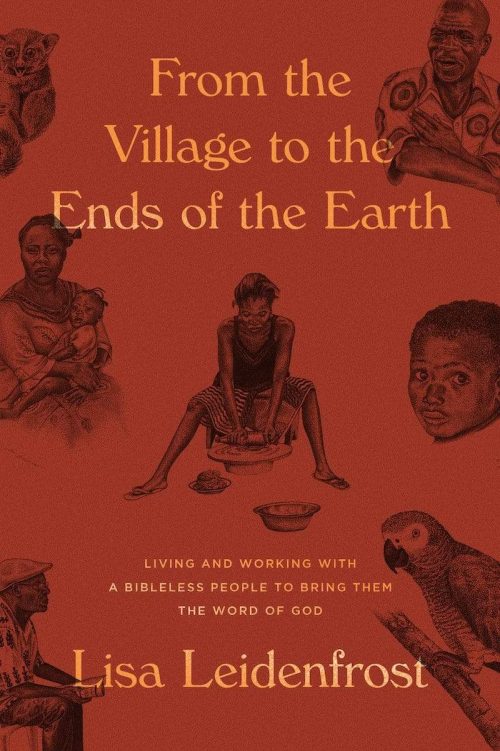 In this sequel to At the Edge of the Village , Lisa Leidenfrost describes life in her village in Côte d' Ivoire. Although there are exciting stories about the local witch doctor and escaping from a civil war, life as a missionary is often surprisingly normal. Family life need not be crowded out by frenetic translation schedules and fundraising furloughs. Whether it’s the humorous cultural differences in hospitality or courtship, or the kids’ adventures with driver ants, snakes, bees, a bushbaby, or a parrot, From the Village to the Ends of the Earth shows what it is like to raise a family while building the kingdom of God in Africa.
In this sequel to At the Edge of the Village , Lisa Leidenfrost describes life in her village in Côte d' Ivoire. Although there are exciting stories about the local witch doctor and escaping from a civil war, life as a missionary is often surprisingly normal. Family life need not be crowded out by frenetic translation schedules and fundraising furloughs. Whether it’s the humorous cultural differences in hospitality or courtship, or the kids’ adventures with driver ants, snakes, bees, a bushbaby, or a parrot, From the Village to the Ends of the Earth shows what it is like to raise a family while building the kingdom of God in Africa.

